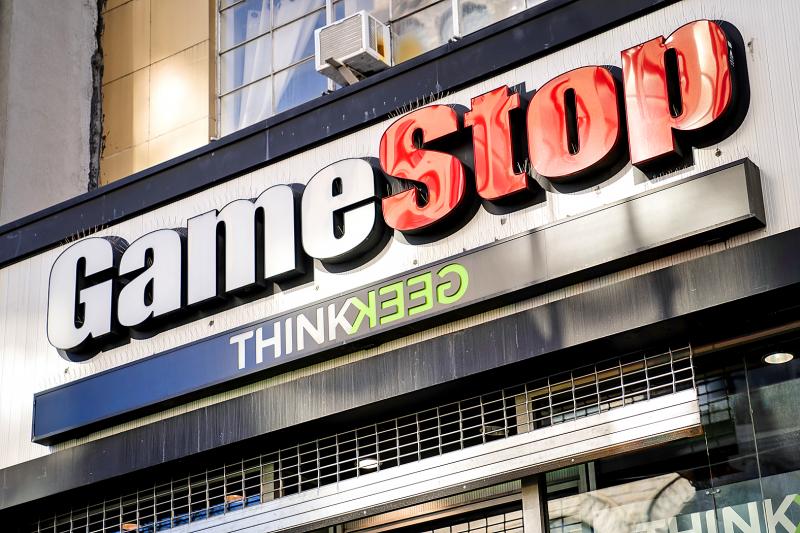GameStop Corp plans to launch a marketplace for nonfungible tokens (NFT) for gamers by the end of the year, a person familiar with the matter said, sending shares of the gaming retailer soaring in extended trading.
The company, which is in the middle of a turnaround to focus on digital sales rather than brick-and-mortar shops, is also in talks with crypto and blockchain companies about which tokens could be used on the NFT marketplace, the person said, asking not to be named.
It is also discussing with partners the potential to create funds of up to US$100 million each to invest in NFT content creators and gaming companies, the person said.

Photo: AP
Over the past few months, GameStop has assembled a team of more than 20 people who are focused on the crypto-related push, the person said.
The Wall Street Journal earlier reported on GameStop’s crypto and NFT plans.
The shares jumped 29 percent in extended trading.
Investors have been waiting for months to hear more about the firm’s strategy from GameStop chairman Ryan Cohen, a cofounder of pet supply company Chewy Inc, who joined the board earlier this year with a vision to revive growth.
The Texas-based company suffered in the shift from gaming cartridges to digital downloads, and was further battered by the COVID-19 pandemic, which shuttered retail shops.
However, it has been championed by retail investors who organize in online forums such as Reddit, and boosted the stock by almost 700 percent last year, despite little fundamental evidence to support the gains.
The company has posted years of annual revenue declines.
The largest market for NFTs, OpenSea, saw an explosion in sales last year, with monthly sales volume peaking at US$3.4 billion in August, up from US$96.7 million in February, Dune Analytics data showed.
The company makes money by taking a 2.5 percent cut of every transaction.
Seeing this traction, a slew of other NFT marketplaces have sprung up in recent months, hoping to attract users.
GameStop has millions of loyal gaming customers whom it can direct to its marketplace.

UNCERTAINTY: Innolux activated a stringent supply chain management mechanism, as it did during the COVID-19 pandemic, to ensure optimal inventory levels for customers Flat-panel display makers AUO Corp (友達) and Innolux Corp (群創) yesterday said that about 12 to 20 percent of their display business is at risk of potential US tariffs and that they would relocate production or shipment destinations to mitigate the levies’ effects. US tariffs would have a direct impact of US$200 million on AUO’s revenue, company chairman Paul Peng (彭雙浪) told reporters on the sidelines of the Touch Taiwan trade show in Taipei yesterday. That would make up about 12 percent of the company’s overall revenue. To cope with the tariff uncertainty, AUO plans to allocate its production to manufacturing facilities in

TAKING STOCK: A Taiwanese cookware firm in Vietnam urged customers to assess inventory or place orders early so shipments can reach the US while tariffs are paused Taiwanese businesses in Vietnam are exploring alternatives after the White House imposed a 46 percent import duty on Vietnamese goods, following US President Donald Trump’s announcement of “reciprocal” tariffs on the US’ trading partners. Lo Shih-liang (羅世良), chairman of Brico Industry Co (裕茂工業), a Taiwanese company that manufactures cast iron cookware and stove components in Vietnam, said that more than 40 percent of his business was tied to the US market, describing the constant US policy shifts as an emotional roller coaster. “I work during the day and stay up all night watching the news. I’ve been following US news until 3am

Taiwan will prioritize the development of silicon photonics by taking advantage of its strength in the semiconductor industry to build another shield to protect the local economy, National Development Council (NDC) Minister Paul Liu (劉鏡清) said yesterday. Speaking at a meeting of the legislature’s Economics Committee, Liu said Taiwan already has the artificial intelligence (AI) industry as a shield, after the semiconductor industry, to safeguard the country, and is looking at new unique fields to build more economic shields. While Taiwan will further strengthen its existing shields, over the longer term, the country is determined to focus on such potential segments as

COLLABORATION: Given Taiwan’s key position in global supply chains, the US firm is discussing strategies with local partners and clients to deal with global uncertainties Advanced Micro Devices Inc (AMD) yesterday said it is meeting with local ecosystem partners, including Taiwan Semiconductor Manufacturing Co (TSMC, 台積電), to discuss strategies, including long-term manufacturing, to navigate uncertainties such as US tariffs, as Taiwan occupies an important position in global supply chains. AMD chief executive officer Lisa Su (蘇姿丰) told reporters that Taiwan is an important part of the chip designer’s ecosystem and she is discussing with partners and customers in Taiwan to forge strong collaborations on different areas during this critical period. AMD has just become the first artificial-intelligence (AI) server chip customer of TSMC to utilize its advanced